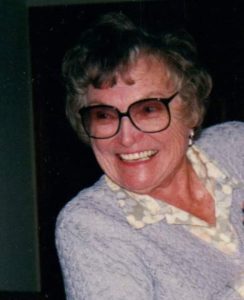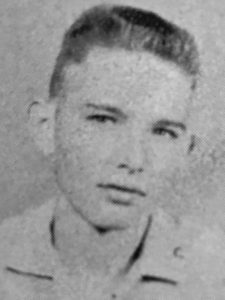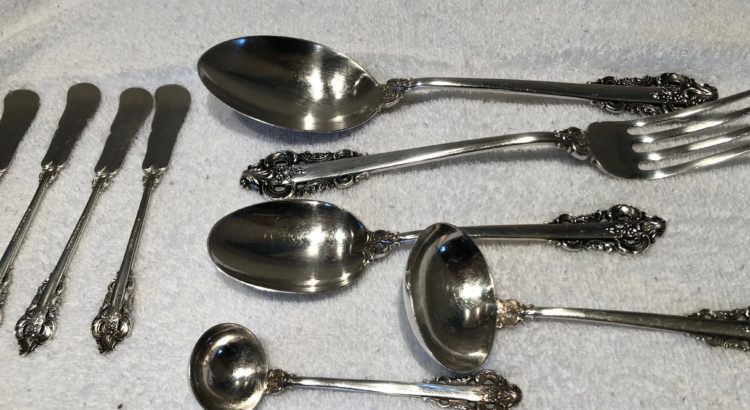We all can use a sure-fire way to please our in-laws. As I got ready for Thanksgiving, I smiled while I polished the silver and remembered my guaranteed way to please my mother-in-law, Alice.

Contrary to common stereotypes, my husband, Michael, didn’t marry a woman who is anything like dear mom. Alice’s household was always organized, while I tolerated chaos. She was a terrific cook and entertainer, while I barely managed the basics–mostly with tuna fish or ground beef.
Alice was the belle of any crowd in golf spikes or spike heels. She was flashy and always groomed to perfection for entertaining or competing at golf and bridge. About all I could manage for glamor was slapping on false eyelashes.
Family seemed to be the only overlap in our interests, but that was enough because I was married to Alice’s adored “Mikey,” and even through dark times, I knew that she loved me and always had my back.
Alice gave me a huge gift after Michael and I had been married for ten years. I had a chance to go to Europe for over three weeks with my dad to see my sister who lived there. Alice volunteered to come to take care of our four kids ages three to eight. For nearly four weeks! Two of those critters made life so miserable for babysitters that we could only hire teen boys with life experience to anticipate our sons’ tricks.
Alice could manage anyone. If charm didn’t work, her brute mental force could put any troublemaker into his place.
I wanted to please Alice, but she didn’t always make it easy. She had a laser focus when the goals and the rules were clear. Not so much on other issues. Had Michael taken her attitudes too seriously, it could have been a rough ride for me as she tossed around opinions about life. But her thoughts often ran off Michael’s back as he shielded me from ideas that could change tomorrow.
Alice was good at change. She had been nurtured to be resilient and to manage transitions with positive optimism. Her dad was a Salt Lake City policeman, and her mother died after a long illness when Alice was 16. Her older sister was already on her own, so as her mother faded, Alice relied on friends and her church for support as she managed home responsibilities.
Then she went to a local state university and joined the Delta Gamma sorority where she made friends and kept some of them through years of separation.
Good friends were constants in Alice’s life.
My father-in-law was an accountant for a multinational construction company, and as the company took on new jobs, Michael Sr. would go to a location to hire and train locals. Then the family relocated again. Some of these moves were rapid. Michael went to four different high schools in three years. However, when I met him, his folks had been living in Peru for an extended time.
Throughout the family moves, Michael had an advantage over his younger sisters. He was a good athlete, so whenever they hit a new town, he could start weaving his into the community through sports. But before he developed lasting friendships, they were on to another place for him to find a niche.
One year, Michael and I took a road trip and visited places he had lived in the southwest. As we drove, I heard about exploits and athletic accomplishments in each locale. As I watched the scenery go by, I thought some places were lovely, like Santa Fe, nestled in the foothills of mountains with its classic pueblo architecture.
Then we drove southwest to Grants, New Mexico.

I looked out as we got close to Grants and thought it would have been pitiful to live in the middle of a dull desert that sagebrush couldn’t pretty up. Michael said when they moved there, uranium mining was prospering, and Grants seemed alive with activity. He added that it had been fine for him since he moved there with a driver’s license he got in Texas when he was fourteen. He was independent and could work as a survey rodman or cleaning the administrative offices when he wasn’t in school or playing sports.
Then I asked, “But what about your mother? How did she ever manage in a place like this?”
“She always seemed to do fine. I don’t think Grants was any different.”
“Whatever did she do with her time?”
“She always got involved in the community one way or another. In Grants, I think it was a mental health organization.”
As I looked around, I figured a mental health organization would have been useful.
We went to see Alice on our way home, and I asked her, “How did you ever manage to keep your sense of humor about driving into a town like Grants knowing you would be living there?”
“What do you mean, ‘How did I manage in Grants?'”
“Oh my gosh, if I’d driven into that mining town out in the middle of a desert, I’d have been so depressed!”
“Oh, there was nothing depressing about Grants! We had friends there with us. Mikey fit right into sports at school. Did he say it was depressing?”
“Nope. He talked about the good times he had, but he wasn’t you. To me, it would have been a downer to be in a place like that.”
“Well, you weren’t there.”
End of discussion.
Later I realized that Grants had been a vibrant boom town when she arrived, but when I drove into town, little of the boom remained. However, discussing the reasons for our varied opinions was rarely something that Alice and I did in real-time.
We just accepted our differences and moved on.
After Dad retired, Michael’s folks eventually settled in sunny St. George, Utah. When we took trips to visit them, Michael had lots to do. Golfing. Working on his tan. Just being Mikey.
But I don’t golf and can’t tolerate laying around in the sun for long, so I was stuck with hanging out, taking walks, and figuring out how to be helpful. In her well-organized home, Alice was a cook who did it all by herself, so I’d do the dishes and hope I put them away in their proper place.
And then, I discovered my job to stack some points.
I could polish silver, and Alice had a lot of silver. From their years in Peru, she had flatware, golf trophies, elegant serving pieces, and silver artwork pieces. If they made it in silver, she had it. Even toothpicks. When Alice wasn’t golfing, planning a bridge tournament or a party, she sat in front of her coffee table watching daytime TV and flipping solitaire cards. And during those times, I happily made the silver shine.
After Michael’s dad died, we’d travel to see Alice more frequently, but then I’d fly home alone and get back to work after a few days of non-golfing. But before I left, the silver gleamed, and Alice flashed her famous smile as she looked at my handiwork.
This year, as I got ready for Thanksgiving, I missed Alice and her love.
It had been a lot more fun to polish silver when I was working for that Delta Gamma smile.
